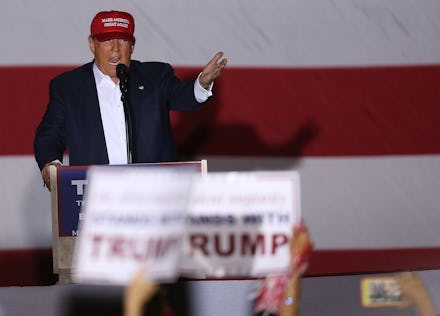This Survey Shows Just Who Is Feeling the Need to Make America Great Again

A new survey by the New York Times sheds some light on the Americans rallying for real estate billionaire Donald Trump. He's doing well among whites with no high school diploma (he loves 'em), voters who deem their ancestry as "American," mobile home residents, blue-collar workers and those who have voted for candidates who supported racial segregation. Trump also picks up a large portion of the evangelical Christian vote.
The candidate does worse among labor force participants, historically liberal Republicans and white Anglo-Saxon Protestants.
Read more: Louis C.K. Compared Donald Trump to Hitler, Semi-Endorsed Kasich
Trump's coalition is thus strongest in places where the U.S. manufacturing industry has picked up and left or gone out of business entirely, as well as rural areas and large stretches of the South. Places where, ironically, a lot of people have heard "you're fired."
"It's a nonurban, blue-collar and now apparently quite angry population," Brookings Institution demographer William Frey told the Times. "They're not people who have moved around a lot, and things have been changing away from them, but they live in areas that now feel stagnant in a lot of ways."
Trump captures both Republican and Democratic-leaning counties that match these trends, adding some support to the candidate's claim he is driving higher turnout in this year's primaries.
Florida Sen. Marco Rubio, whose campaign is tanking amidst desperate poll numbers in his home state and inability to capture the necessary number of delegates, failed to tap into the Trump demographic. Some recent polls put the senator behind Trump by double digits.
As the Chicago Tribune was quick to point out recently, Trump isn't a monolith — he does well among well-educated voters in some areas, and poorly among evangelicals in others.
So Trump's core supporters include those the modern U.S. economy has historically left behind as well social conservatives who feel disoriented by rapid changes in their way of life. Sprinkled among them are a large number of Americans with troubling views on race. Theirs are the voices that have largely driven the ongoing Republican primaries and have consistently rejected the slew of GOP governors, senators and congressmen who have dropped out since the beginning of the race.